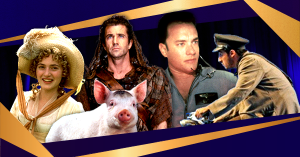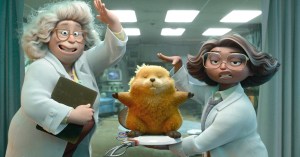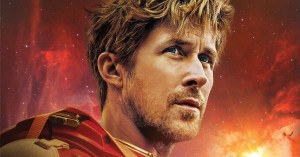Total Recall: We Own The Night and Other Sibling Showdowns
Brothers up in arms: Teenage Mutant Ninja Turtles II: The Secret of the Ooze, Gattaca, The Royal Tenenbaums.
This week, We Own the Night hits theaters, telling the story of two
brothers (played by
Joaquin Phoenix and
Mark Wahlberg) on opposite sides of the
law. The sibling rivalry is often the basis for compelling cinema, something we’ll explore in this week’s Total Recall.
Sibling conflict has been at the root of many great works of art, be they The
Godfather (100 percent),
King Lear
(50 percent), or the first couple Kinks albums. The reasons
are obvious: How can people with such similar DNA turn out so differently? Why,
with so much in common, do brothers and sisters disagree, or follow decidedly
different paths in life? From uneasy Thanksgiving reunions to Cain-and-Abel-esque
showdowns, cinematic sibling dysfunction runs the gamut. Let’s take a look at
some memorable family feuds.
 We can’t imagine someone who was enamored with the dark tone of the original
We can’t imagine someone who was enamored with the dark tone of the original
Teenage Mutant Ninja Turtles (38 percent) being particularly happy when
the jokier
Secret of the Ooze (35 percent) came out. But for a kid growing up
during the grunge era, 1991 was a perfect storm of Turtles mania: An
avalanche of merchandise, a great cartoon on the air, and Turtles in Time for the Super Nintendo. And, of course, there was the movie.
Secret of the Ooze had new monsters, more interesting human characters,
snappier pacing, and with an eminently quotable song from rap-poseur
Vanilla
Ice, Donna Britt of the Washington Post praises that "it has enough jokes
aimed at adults to make for a relatively painless outing for parents forced to
take their kids to see it."
While Splinter dispensed wisdom like the ad hoc parental unit he was, the relationship between Leonardo (the leader) and Raphael (the
loose cannon) was always easier to digest for kids. Both devoted to honor and
duty but completely different in their approaches, they were your typical
squabbling duo that couldn’t stand each other’s presence but would do even worse
when separated. The two create the emotional crux of the series, which is
further explored in the recent animated
TMNT
(31 percent).
 Along with The
Along with The
Princess Bride (95 percent) and
Dead Poets Society
(83 percent), 1997’s
Gattaca (80 percent) was one of those movies you’d always see for
the first time in middle or high school. It’s a great all-purpose
movie: a literate script for English class, lectures about DNA for biology
class, and the film’s thesis on human worth and potential can be shoehorned into
high schools affluent enough to have philosophy classes. Gattaca stars
Ethan Hawke
as Vincent Freeman, a genetically inferior man tormented by his superior brother
and a harsh reality: he can never achieve his dream of being an astronaut
through legal means. It’s a thoughtful movie that James Berardinelli calls "a
cautionary tale about the dangers of letting scientific ability outstrip ethics
and [a] morality play about the irrationality of bigotry."
Loren Dean
co-stars as Vincent’s brother, Anton. The two squabble and compete with
increasing severity. Anton eventually leads a shapeless life as a detective,
while Vincent pushes himself beyond his supposed genetic limits. Writer-director
Andrew Niccol
demonstrates with Gattaca that characters don’t necessarily have to be
supplanted by special effects and gadgets. Along with his screenplay for
The Truman Show
(95 percent), Niccol always insists on laying the human touch on science
fiction.
 In every Wes
In every Wes
Anderson movie looms the long shadow of the father figure, but some of the
most amusing relationships in his films are between brothers. See Bob Mapplethorpe
and his sibling John (aka Future Man) in
Bottle Rocket (78
percent). Or the trio on that spiritual bonding journey in
The Darjeeling
Limited (64 percent). And there’s no shortage of ruined familial
relationships in 2001’s
The Royal Tenenbaums
(80 percent), Anderson’s third feature-length effort. The film has endured as one
of Anderson’s most beloved, called "a New Yorker cartoon come to life,
droll and sad and knowing at the same time" by MaryAnn Johnson of Flick
Filosopher.
Amidst the beyond-neurotic denizens that make up the Tenenbaum household are
brothers Chas and Richie, played by
Ben Stiller
and Luke Wilson,
respectively. One of Anderson’s strengths is a knack for casting (Willem
Dafoe as a sensitive German oceanographer in
Life Aquatic
remains brilliant), and here Stiller and Wilson get to take their "shtick" to an
extreme. Clashing Stiller’s manic outbursts against Wilson’s lackadaisical
demeanor creates the perfect comic contrast.
Given the inherent potential for love and conflict in any family, there is no
end to the number of stories that can be harvested from the cracks in fraternal
or sororal relations. Check out
Hannah and her Sisters (92 percent),
Rain
Man (90 percent),
Whatever Happened to Baby Jane? (89 percent), or
Vincent
& Theo (86 percent) for further adventures into the complex lives of
siblings.




